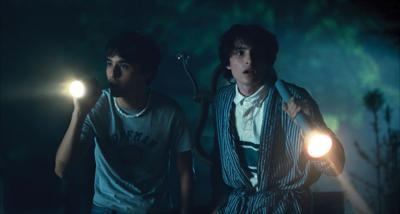There is a very specific kind of horror performance that makes legends — an insecure and uncertain character portrayed with the kind of sure hand that only an actor’s complete confidence in the film can yield. The apotheosis of this kind of turn is Crispin Glover in Friday the 13th: The Final Chapter, but you’ll also see it in Hank Harris in Hellbent, Stephen Geoffreys in Fright Night or Nicolas Cage in Vampire’s Kiss. This kind of performance is gutsy in the ways that never win Oscars but earn the lifelong respect of the genre community, an immortality commemorated around campfires, medium- to extra-large-size bongs or studio conference tables when they speak of inspiration but are actually looking for something to dilute and resell to audiences. That’s what Fred Hechinger does in Hell of a Summer.
When you spend a film with a lead character who simultaneously is and is not the romantic lead but also walks the fine line between “couldn’t possibly be the killer” and that creeping suspicion that This Guy Might Be the Killer — and who keeps that going for the first two acts without ever tipping his hand or breaking the fourth wall — you have to respect that. Even if the rest of Hell of a Summer were a road-company production of the Passion Play we as a culture have been re-enacting since Friday the 13th first hit the big screen, it would still be worth a look. But the feature debut from writing/directing/acting team Billy Bryk and Finn Wolfhard is neither rehash nor slash-by-numbers. It’s a throwback in form, but it engages with the material through its own lens. There are no easy references or signifiers of past efforts to grab that automatic goodwill that some genre pastiches wallow in.
In the grand tradition of summer-camp horrors, this film is an exorcism of the particular uneases that disturb a generation. It’s not trying to remix the sexual minefields of The Burning or Sleepaway Camp, or parse the dialogue between generations like Final Girls does, or reckon with collective guilt the way the Fear Street trilogy does. If anything, Hell of a Summer is a statement that Wes Craven once again saw the way the winds were blowing, and Scream 4 increases its reputation as a work of prophecy. It’s also oddly cozy — a fun chill amid the bloodletting. (If anything, it could have used a longer runtime, especially in its first third, where the vibe hits the hangout-horror equilibrium of an All the Boys Love Mandy Lane or an April Fool’s Day. The brisk 88-minute runtime hurtles by.)
This week’s recommended title is Leigh Janiak’s trilogy-ender, Fear Street Part Three: 1666
But back to that lead performance. As Jason Hochberg, Hechinger is giving us a 24-year-old guy who just turned down an internship with a law firm to return as a counselor to Camp Pineway, the scene of his sometime triumphs/sometime frustrations, as well as the place that may constitute the extent of his social development. And while he seems utterly content to be back, there’s a sense that he is internalizing his mom’s anxiety about his future, and whatever was once liberating about this place has now become a harness anchoring him in place. Also, there’s a murderer.
His counselor compatriots are a fascinating assemblage of this era’s youth archetypes, ready to be perforated and dissected (emotionally and literally). Personal faves include Bobby (Bryk), who is allowed a psychological complexity that continues to evolve in funny and unfamiliar ways when compared to many contemporary horrors, and Claire (Abby Quinn), who isn’t really like any female characters we’ve seen in this type of film before. As for Wolfhard, he knows how an ensemble works and finds the exact right spaces to dip in and out, keeping nimble in front of the camera and doing the work. And kudos to any horror film that snags Adam Pally, herein part of the film’s opening inciting incident.
That said, the film pulls its punches with its kills to the extent that it actually resembles those Golden Age slashers that got cut to the bone to appease the then-MPAA. There’s one exception to this, and it’s a scene that has more to say semiotically than pretty much any other scene in the film, and it would be a great big spoiler to get into, but you’ll know it when you see it, and you may likely also wonder, “Why this one?” There are also several nighttime outdoor sequences that have just enough light to see what’s going on — provided you’re seeing the film in a theater that engages in proper lamp-bulb maintenance. (You will likely already know if your preferred theater does this or not.) But on the whole, Hell of a Summer is a comfy blanket of a film with some sharp edges, featuring a performance that’ll stick with you for a while to come.






